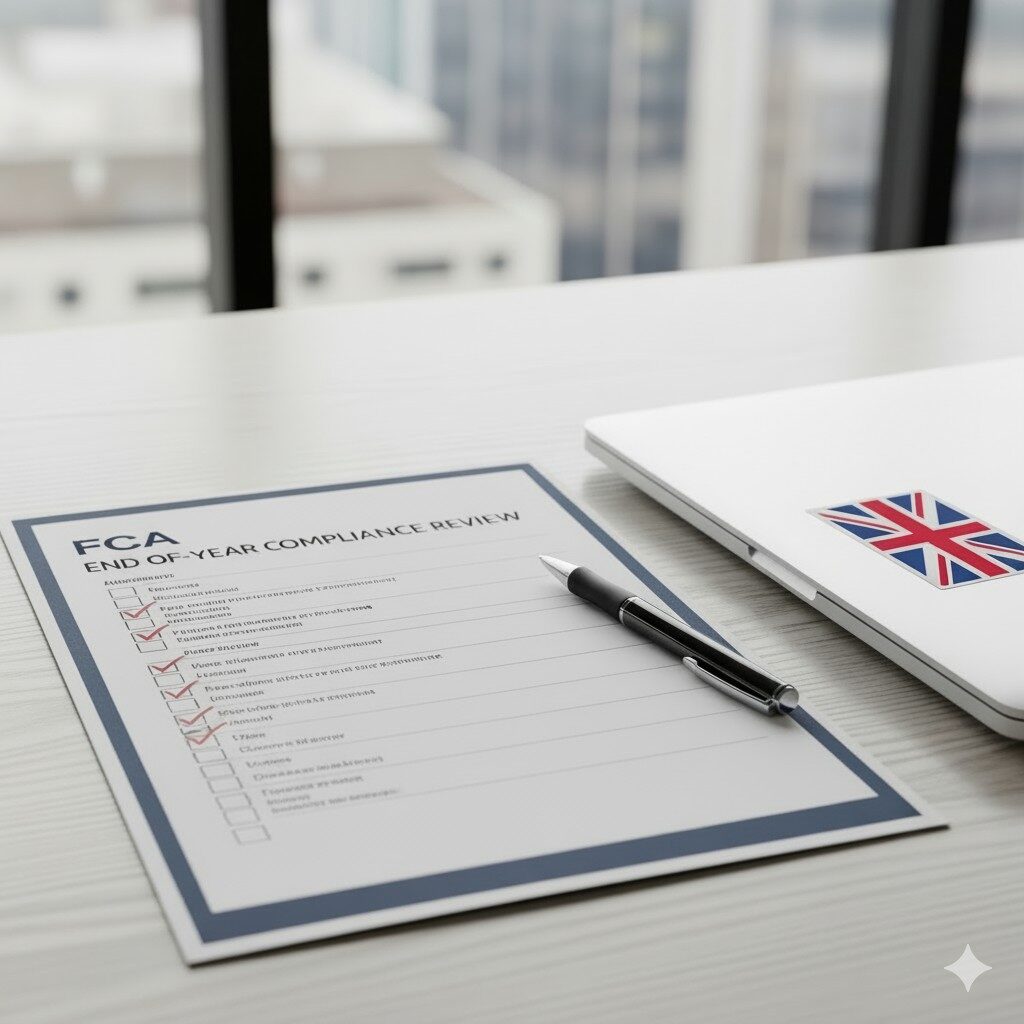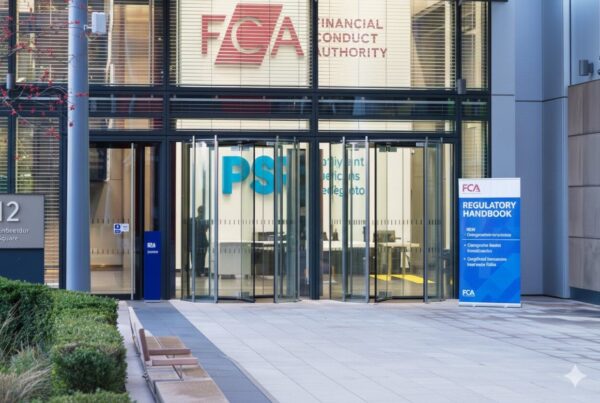Q4 is the ideal time for SME commercial insurance brokers, owners, directors and compliance officers to conduct a comprehensive internal review and ensure they’re prepared for any scrutiny from the Financial Conduct Authority (FCA).
Nobody wants to deal with a surprise knock from the FCA. A little preparation now can prevent small issues from becoming big problems. It also shows the FCA that you take compliance seriously, which is a big plus. It’s about being prepared, not paranoid.
A proactive approach can prevent issues from escalating and help your firm run more efficiently. This article provides a clear, actionable checklist to help you navigate the end-of-year compliance landscape.
READ ALSO: The FCA’s fine to JLT- and 4 things you should do about it.
People & Processes (SM&CR Checklist)
The Senior Managers & Certification Regime (SM&CR) is all about accountability. The FCA wants to know that firms have a clear understanding of who is responsible for what. As a smaller firm, it’s easy to think this only applies to the big players, but that’s a mistake. A good Q4 review starts with a look at your people and the processes they follow.
The FCA wants to know that senior individuals are accountable for the actions of their firm and that staff are competent for their roles. A proactive Q4 review is the perfect time to address this.
Start by reviewing your organizational structure. Do you have a clear Statement of Responsibilities for your senior managers? For certified staff, are you confident they are fit and proper to perform their roles?
This review should go beyond just looking at job titles. It’s about understanding the specific duties and responsibilities assigned to each individual, from the top down. Once you’ve defined the people, look at the processes they follow.
Do your procedures for new client onboarding, for example, align with regulatory requirements? Are there documented procedures for handling complaints, managing conflicts of interest, and reporting breaches?
A thorough Q4 review allows you to identify any weak points in your operational processes. Strengthening these processes not only ensures compliance but also improves efficiency and reduces the risk of errors.
By taking a proactive, two-pronged approach—focusing on both your people and your processes—you can demonstrate to the FCA that your firm is not only compliant but also well-managed and resilient. This approach goes a long way in building trust with both regulators and clients.
Here is a simple checklist to help you ensure you are compliant with the Senior Managers & Certification Regime (SM&CR).
Senior Managers & Certification Regime (SM&CR) Compliance Checklist
1. Senior Managers
- Statements of Responsibilities (SoRs): Have you reviewed and updated the SoRs for your Senior Managers? Any changes in their roles or responsibilities must be reflected here. Remember, these documents are a cornerstone of your firm’s accountability framework.
- Management Responsibilities Map: Does your responsibilities map accurately reflect how management and governance are structured within your firm? Ensure it’s up-to-date and clearly shows reporting lines and handovers.
2. Certified Staff
- Fitness & Propriety (F&P) Checks: This is a crucial, ongoing requirement. For all staff in certified roles (those who could cause “significant harm” to customers or the market), have you reviewed their F&P? This isn’t just a one-off check; it’s an annual assessment. Consider whether any new information or changes in circumstances would affect their ability to perform their role.
- Certification Process: Are you on track to issue annual certificates to your certified staff? Don’t leave this to the last minute. This process confirms that you’ve completed your due diligence on their competence and conduct.
3. All Staff
- Conduct Rules Training: All staff, from senior managers to administrative assistants, are subject to the FCA’s Conduct Rules. Have you completed the required training and reinforced a culture of good conduct? This is a great opportunity to remind everyone of the importance of acting with integrity and due care.
Client Files & Suitability (Spot-Check Action Points)
The FCA’s fundamental objective is consumer protection, which makes their scrutiny of how firms treat customers a top priority.
To proactively prepare for this, the most effective strategy is to conduct a thorough internal audit of a representative sample of your client files.
This process should go beyond a simple check for complete paperwork; it should be a deep dive into the entire customer journey. Reviewing a selection of client files allows you to assess the fairness and clarity of your advice, the transparency of your fees, and the overall suitability of the products you’ve recommended.
By identifying and correcting any issues in a small sample, you can implement changes across your entire firm, ensuring that your practices consistently align with the FCA’s expectations for treating customers fairly.
Customer-Focused Compliance Checklist
Here is a checklist to help you ensure your processes and client files align with the FCA’s focus on consumer protection.
1. Review Your Process
- Information Gathering: Does your process for gathering and recording client information meet the requirements of the FCA’s handbook? Ensure you are collecting sufficient information to understand the client’s demands and needs, their risk tolerance, and their financial situation.
2. Sample Client Files
- Demands & Needs: Is there clear documentation showing you’ve understood the client’s specific demands and needs? This is non-negotiable.
- Suitability: Where advice was given, is there a clear record of why the recommended policy was suitable for that client? This should be a direct link between the client’s needs and the policy’s features.
- Disclosure: Have you properly disclosed all relevant information, including commissions and any potential conflicts of interest? The FCA is very focused on transparency around remuneration, especially since the introduction of the Consumer Duty.
- Record-keeping: Are the files complete and easy to navigate? The FCA expects you to be able to produce a clear audit trail of your client relationship and decision-making process.
Consumer Duty (Review & Board Report)
The FCA’s Consumer Duty represents one of the most significant regulatory shifts in recent years. It requires firms to go beyond technical compliance and demonstrate that they consistently deliver good outcomes for retail customers.
For SME insurance brokers, this means embedding customer-focused culture, testing processes against the four Consumer Duty outcomes, and evidencing how decisions benefit clients.
Q4 is the ideal time to carry out a Consumer Duty review — both to prepare for your end-of-year compliance sign-off and to ensure your Consumer Duty Board Report is up-to-date, accurate, and approved by your governing body.
This review should include:
- Assessing whether your products and services deliver fair value.
- Reviewing customer journeys for clarity and transparency.
- Checking whether your communications support informed decision-making.
- Ensuring robust governance, including Board oversight and reporting.
Consumer Duty Compliance Checklist
Review All Outcomes
- Products & Services: Do they meet the needs of your target market?
- Price & Value: Have you tested fair value across your product set, including commission and premium finance arrangements?
- Consumer Understanding: Are communications written in plain English, with clear explanations of exclusions, risks, and costs?
- Consumer Support: Can clients easily access help, make a claim, or complain without unnecessary barriers?
Board Report
- Has your firm produced a Consumer Duty Board Report this year?
- Does it clearly evidence monitoring of outcomes, value assessments, and remedial actions?
- Has the report been approved by your Board or governing body, and is it available for the FCA if requested?
Approval & Record-Keeping
- Do you maintain records of the data and MI used to evidence compliance with the Duty?
- Can you demonstrate how insights from complaints, file reviews, or customer feedback have been fed back into product governance and client care?
By embedding these practices, you can show both the FCA and your clients that Consumer Duty is not just a compliance exercise but a driver of better business.
Systems & Controls (AML & Data Security Review)
The final, crucial piece of the puzzle for any financial services firm is to ensure that internal systems are robust enough to protect both the firm and its clients. This involves fortifying your defences against a wide range of threats, with particular emphasis on financial crime and data breaches.
The FCA holds firms accountable for preventing money laundering, fraud, and terrorist financing. This requires not only having clear policies and procedures in place but also implementing effective technology and training staff to identify and report suspicious activity.
Similarly, the protection of client data is paramount, not just from a regulatory standpoint but also to maintain customer trust. A single data breach can lead to severe financial penalties, reputational damage, and a loss of customer confidence.
Therefore, a comprehensive Q4 review must include an assessment of your cybersecurity measures, data protection protocols, and incident response plan. By proactively addressing these vulnerabilities, you can build a more resilient firm that is better equipped to withstand external threats.
Systems and Controls Compliance Checklist
Here is a final checklist to help you ensure your internal systems are robust enough to protect your firm and your clients from financial crime and data breaches.
Anti-Money Laundering (AML)
- Risk Assessment: Have you reviewed your firm-wide AML risk assessment to ensure it’s still accurate? Are you regularly screening new and existing clients for sanctions, PEP (Politically Exposed Person), and adverse media lists?
- Training: Have your staff completed their annual AML training? They must know how to identify and report suspicious activity.
- Record-keeping: Are your records of customer due diligence (CDD) and enhanced due diligence (EDD) up-to-date and easily accessible?
Data Security & Protection
- GDPR Compliance: As a commercial insurance broker, you hold sensitive client data. Are your data protection policies and procedures up-to-date? Are you only holding data for as long as you need it?
- Cybersecurity: When was your last cybersecurity review? The FCA expects you to have robust systems to protect against cyber threats. This includes firewalls, secure client portals, and a clear plan for what to do in the event of a breach.
Key Takeaways & Next Steps
Navigating an FCA compliance review can feel overwhelming, but it doesn’t have to be. By adopting this (Simple?) proactive, structured approach, you can identify and resolve potential issues before they become problems.
This year, the Consumer Duty has become the FCA’s central lens. That means your Q4 checklist must go beyond SM&CR, client file audits, and AML checks to include a thorough review of customer outcomes and the completion of your Consumer Duty Board Report.
Here’s what to do next:
- Finalise your SM&CR checks: Update Statements of Responsibilities, fitness & propriety reviews, and certification.
- Audit client files: Spot-check suitability, disclosure, and demands & needs documentation.
- Complete your Consumer Duty review: Test outcomes across products, value, communications, and support.
- Produce and approve your Consumer Duty Board Report: Ensure your Board has signed off, and that evidence is ready to share with the FCA if required.
- Re-test your systems & controls: AML, data protection, and cybersecurity should all be reviewed before year-end.
👉 Don’t wait for a letter from the FCA to get your house in order. If you’d like to talk through your Q4 compliance checklist or need support producing your Consumer Duty Board Report Get in touch with our team here, and we will help you stay compliant.
My Virtual Compliance offers bespoke compliance solutions and practical guidance for busy professionals just like you.




